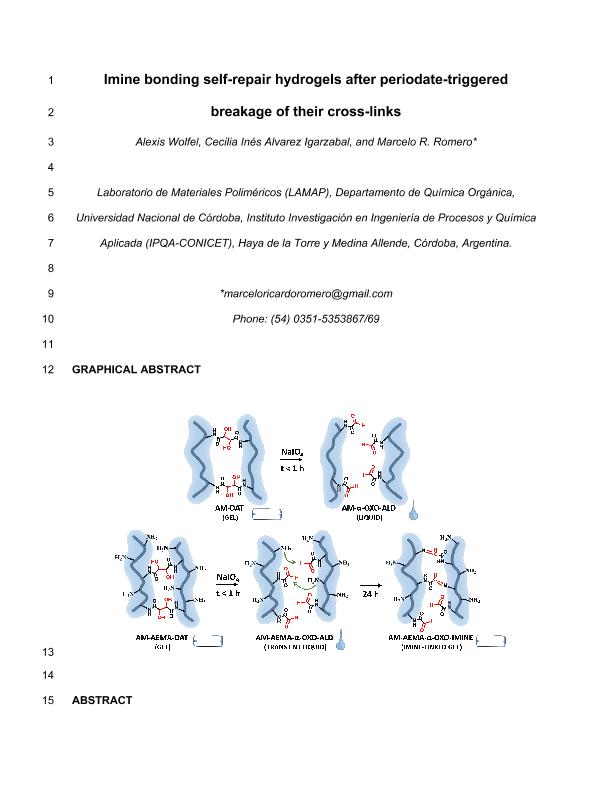Mostrar el registro sencillo del ítem
dc.contributor.author
Wolfel Sánchez, Alexis

dc.contributor.author
Alvarez Igarzabal, Cecilia Ines

dc.contributor.author
Romero, Marcelo Ricardo

dc.date.available
2021-10-14T14:00:23Z
dc.date.issued
2020-11
dc.identifier.citation
Wolfel Sánchez, Alexis; Alvarez Igarzabal, Cecilia Ines; Romero, Marcelo Ricardo; Imine bonding self-repair hydrogels after periodate-triggered breakage of their cross-links; Pergamon-Elsevier Science Ltd; European Polymer Journal; 140; 11-2020; 1-10
dc.identifier.issn
0014-3057
dc.identifier.uri
http://hdl.handle.net/11336/143554
dc.description.abstract
The development of new materials with smart properties is currently expanding the development of new technologies. Therefore, the design of materials with novel sensitivities and smart behavior is important for the development of smart systems with automated responsivity. We have recently reported the synthesis of hydrogels, cross-linked by N,N´-diallyltartardiamide (DAT). The covalent DAT-crosslinking points have vicinal diols which can be easily cleaved with periodate, generating changes in the hydrogel properties, as well as generating valuable α-oxo-aldehyde functional groups useful for further chemical modification. Based on those findings, we envisioned that a self-healable hydrogel could be obtained by incorporation of primary amino functional groups, from 2-aminoethyl methacrylate hydrochloride (AEMA), coexisting with DAT into the same network. Herein, α-oxo-aldehyde groups generated after the reaction with periodate would arise in the immediate environment of amine groups to form imine cross-links. For this purpose, DAT-crosslinked hydrogels were synthesized and carefully characterized. The cleavage of DAT-crosslinks with periodate promoted changes in the mechanical and swelling properties of the materials. As expected, a self-healing behavior was observed, based on the spontaneous formation of imine covalent bonds. In addition, we surprisingly found a combination of fast vicinal diols cleavage and a low speed self-crosslinking reaction by imine formation. Consequently, it was found a time-window in which a periodate-treated polymer was obtained in a transient liquid state, which can be exploited to choose the final shape of the material, before automated gelling. The singular properties attained on these hydrogels could be useful for developing sensors, actuators, among other smart systems.
dc.format
application/pdf
dc.language.iso
eng
dc.publisher
Pergamon-Elsevier Science Ltd

dc.rights
info:eu-repo/semantics/openAccess
dc.rights.uri
https://creativecommons.org/licenses/by-nc-sa/2.5/ar/
dc.subject
DIOL
dc.subject
IMINE
dc.subject
N,N'-DIALLYLTARTARDIAMIDE
dc.subject
PERIODATE
dc.subject
SELF-HEALING
dc.subject
Α-OXOALDEHYDE
dc.subject.classification
Química Orgánica

dc.subject.classification
Ciencias Químicas

dc.subject.classification
CIENCIAS NATURALES Y EXACTAS

dc.title
Imine bonding self-repair hydrogels after periodate-triggered breakage of their cross-links
dc.type
info:eu-repo/semantics/article
dc.type
info:ar-repo/semantics/artículo
dc.type
info:eu-repo/semantics/publishedVersion
dc.date.updated
2021-09-06T16:05:23Z
dc.journal.volume
140
dc.journal.pagination
1-10
dc.journal.pais
Estados Unidos

dc.description.fil
Fil: Wolfel Sánchez, Alexis. Universidad Nacional de Córdoba. Instituto de Investigación y Desarrollo en Ingeniería de Procesos y Química Aplicada. Consejo Nacional de Investigaciones Científicas y Técnicas. Centro Científico Tecnológico Conicet - Córdoba. Instituto de Investigación y Desarrollo en Ingeniería de Procesos y Química Aplicada; Argentina
dc.description.fil
Fil: Alvarez Igarzabal, Cecilia Ines. Universidad Nacional de Córdoba. Instituto de Investigación y Desarrollo en Ingeniería de Procesos y Química Aplicada. Consejo Nacional de Investigaciones Científicas y Técnicas. Centro Científico Tecnológico Conicet - Córdoba. Instituto de Investigación y Desarrollo en Ingeniería de Procesos y Química Aplicada; Argentina
dc.description.fil
Fil: Romero, Marcelo Ricardo. Universidad Nacional de Córdoba. Instituto de Investigación y Desarrollo en Ingeniería de Procesos y Química Aplicada. Consejo Nacional de Investigaciones Científicas y Técnicas. Centro Científico Tecnológico Conicet - Córdoba. Instituto de Investigación y Desarrollo en Ingeniería de Procesos y Química Aplicada; Argentina
dc.journal.title
European Polymer Journal

dc.relation.alternativeid
info:eu-repo/semantics/altIdentifier/url/https://linkinghub.elsevier.com/retrieve/pii/S0014305720317523
dc.relation.alternativeid
info:eu-repo/semantics/altIdentifier/doi/https://doi.org/10.1016/j.eurpolymj.2020.110038
Archivos asociados
